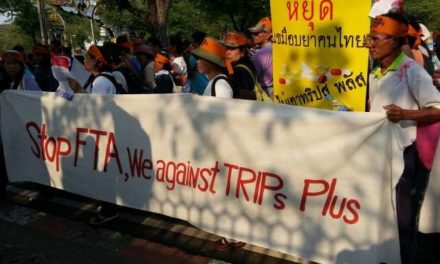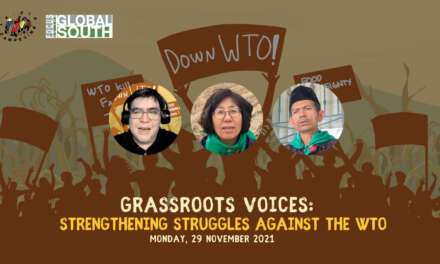Secondly, key decisions made in the Green Room exclude the majority. Nor are the majority promptly informed about such decisions. For example, the Green Room on NAMA last night arrived at 9 issues where delegates were asked to submit their preffered texts to the facilitator of the NAMA negotiations by 3pm this afternoon (15th). This caused a flurry of confusion amongst delegations today. According to inside sources, many delegations by 1pm did not even know what the 9 issues were. Such a short time line also works against the interests of small delegations or makes it difficult for developing groupings to come together to determine any joint position. One analyst asked, on the issue of preference erosion, which was one of the 9 identified issues to be dealt with, “How do you expect delegations to come up with a paragraph in a few hours on an issue where there has been no satisfactory trade related solution in the last 3 years?”
Thirdly, facilitators have been known to be mouth pieces of the US and EU’s positions, portraying the positions of the majors eg. the Minister of Pakistan in the open ended meeting today stated that there is broad agreement on 2 coefficients of the formula, and was attacked by the NAMA 11 (see below). It is therefore questionable if the final drafting of language on the 9 identified issues will represent developing countries’ interests.
Also worrying is the silence on Services, where the draft text from Geneva is the most controversial. Whilst there were open ended meetings yesterday and today on NAMA, Agriculture and Development, there was no such meeting on services, as the majors continue their efforts to try and first buy off the Africans with Aid (loan) packages.
The mood in the convention centre remains somber. But the best news of all today has been the work by various developing country groupings – eg. the NAMA 11, that submitted a letter to the Chair of the Ministerial objecting to any agreement on 2 coefficients in the Swiss formula, and asking for flexibilities; the G90, which has finalized at expert level, an alternative text to Annex C; and Philippines, Indonesia and Venezuela, Kenya and Cuba which have submitted a letter to the Chair stating that they reject Annex C. At the time of writing, they have been joined by several other G90 countries. More are likely to join them.
And the best news of all is that despite tremendous pressures, the LDCs are holding on. There are tough negotiations between LDCs and the US on the S&D provision regarding the provision of quota free and duty free access. The US is currently watering it down so that it is largely meaningless (they are offering duty free quota free access on 95% of tariff lines cover 96% of imports i.e. textiles, which LDCs have their eye on will certainly be excluded). The US is portraying this as a great offer. The Zambian Minister had an unpleasant exchange with USTR Portman on this issue last night and also submitted a letter to the facilitator.








